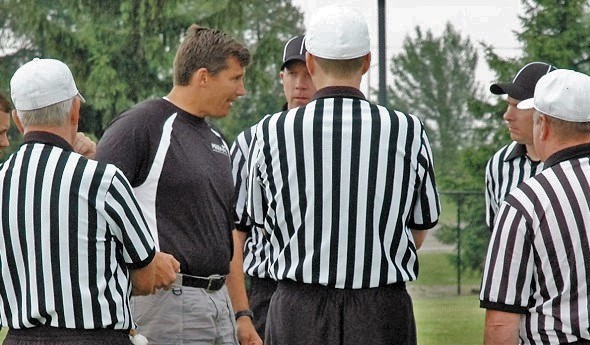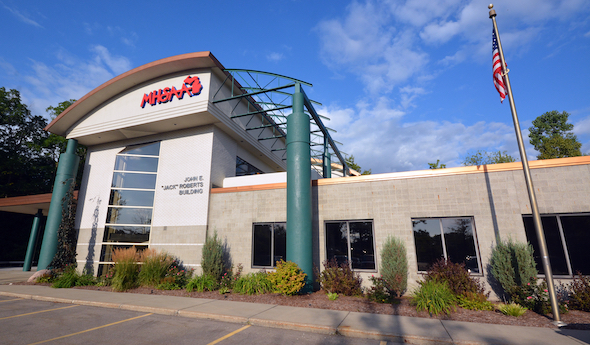
Uyl to Serve as MHSAA's Next Executive Director
By
Geoff Kimmerly
MHSAA.com senior editor
May 8, 2018
Mark Uyl's impact on educational athletics has stretched from his hometown across this state and our country as a teacher, coach, administrator and one of the nation's most respected voices in sport officiating.
The Caledonia native and assistant director for the Michigan High School Athletic Association over the last 14 years is now charged with leading the Association as it continues in the work he has championed for two decades.
 Uyl, 44, has been selected as the next executive director of the MHSAA by its Representative Council. He will succeed retiring Executive Director John E. “Jack” Roberts in August. Roberts, who has served as executive director since the fall of 1986, announced his retirement April 24.
Uyl, 44, has been selected as the next executive director of the MHSAA by its Representative Council. He will succeed retiring Executive Director John E. “Jack” Roberts in August. Roberts, who has served as executive director since the fall of 1986, announced his retirement April 24.
Uyl joined the MHSAA staff in January 2004 and coordinates the Association’s nearly 10,000 officials in addition to serving as director of baseball and administrator of the MHSAA’s catastrophic and concussion care insurance plans. He also has served as director of cross country and wrestling during his tenure.
As assistant director, Uyl was instrumental as the MHSAA became the first state high school athletics association to offer concussion care insurance, which provides gap coverage to assist in covering costs for athletes who are injured while participating in MHSAA-sponsored sports. As an official himself, Uyl has worked to build a stronger relationship with those working high school events that has included an increase in training and support. As a sport director, Uyl has sought to create the best experiences for Michigan high school teams, including with the move of the MHSAA Baseball and Softball Finals to Michigan State University in 2014.
“The foundation built here by Jack Roberts over the last 32 years is the strongest in the country, and I’m honored to have the opportunity to lead our staff in building on that foundation,” Uyl said. “There will be many ways we’ll continue to protect the same values of educational athletics, while also looking for new ways and new opportunities to best serve the students and our member schools in Michigan.”
In addition to his full-time MHSAA duties, Uyl has officiated collegiate baseball since 1997 and is regarded as one of the best at that level. In addition to umpiring major conference baseball all over the United States, Uyl was part of the crews for the 2014 and 2017 College World Series. He also officiated college football for 12 years with several NCAA postseason assignments, and did serve as coordinator of officials for the Michigan Intercollegiate Athletic Association. He was registered with the MHSAA for at least three sports beginning in 1992 and worked the Baseball Finals in 1999.
Additionally, Uyl served on the board of directors of the National Association of Sports Officials (NASO) from 2012-15 and as its chairperson during his final year. Currently, he serves as the high school representative on the Officiating Development Alliance (ODA), which consists of the supervisors of officials for the NFL, NBA, MLB, NHL, CFL, MLS and NCAA Division I sports.
The Council made its decision at the conclusion of its annual Spring Meeting on May 7 in Gaylord. Uyl will become only the fifth full-time executive in the MHSAA’s 94-year history, following Charles E. Forsythe (1931-42, 1945-68), Allen W. Bush (1968-78), Vern L. Norris (1978-86) and Roberts.
“Mark has spent the past 14 years as a highly effective assistant director for the MHSAA,” said Representative Council President Scott Grimes, who serves as Assistant Superintendent of Human Services for Grand Haven Area Public Schools. “He is a proven leader in the organization committed to providing outstanding service to both internal and external constituents. The positive relationships he has fostered with school administrators will help make this a very smooth transition.”
Prior to his time at the MHSAA, Uyl first taught and coached and then served as athletic director and assistant principal at Middleville-Thornapple Kellogg High School, the latter from 2001-03. Before becoming an administrator there, Uyl served as athletic director at Caledonia High School in 2000-01.
 During his tenure as an assistant director at the MHSAA, Uyl also served a four-year term on the Baseball Committee for the National Federation of State High School Associations (NFHS).
During his tenure as an assistant director at the MHSAA, Uyl also served a four-year term on the Baseball Committee for the National Federation of State High School Associations (NFHS).
“Mark was the obvious choice to become the next executive director of the MHSAA,” Roberts said. “Mark has the proper student-focused perspective of educational athletics, excellent person-to-person communications skills and a deep practical understanding of what is happening day to day in school sports in our state and nationally.”
Uyl graduated from Caledonia High School in 1992, and from Calvin College in 1996 with a bachelor’s degree in history and physical education. He later received a master’s in educational leadership from Grand Valley State University. At Calvin, Uyl was a four-year starter on the baseball team, earning all-conference honors twice and serving as team captain.
Uyl resides in DeWitt with his wife Marcy, an accomplished educator and coach who has served as a high school varsity basketball coach since 1994. They have three children: Jackson (17), Grant (15) and Madison (11).
The MHSAA is a private, not-for-profit corporation of voluntary membership by more than 1,500 public and private senior high schools and junior high/middle schools which exists to develop common rules for athletic eligibility and competition. No government funds or tax dollars support the MHSAA, which was the first such association nationally to not accept membership dues or tournament entry fees from schools. Member schools which enforce these rules are permitted to participate in MHSAA tournaments, which attract more than 1.4 million spectators each year.
PHOTOS: (Top) MHSAA Assistant Director Mark Uyl provides pointers to football officials during a summer clinic in 2011. (Middle) Uyl speaks at the NASO officiating summit in 2013 in Grand Rapids.

From the Director: Back to School
August 7, 2020
By Mark Uyl
MHSAA Executive Director
Since March 12, our world has been anything but normal. These times have tested most everything in life, and as summer turns toward fall, we find ourselves still with far more questions than answers. It has been said that an abnormal reaction to an abnormal situation is normal behavior.
Let me start with these abnormal times. I’ve had many conversations with administrators over the past month about the start of school and school sports. The one constant theme is these are anything but normal times. Many of these conversations have moved to the issue of schools starting the academic year virtually while considering whether or not to offer school sports opportunities this fall. Let me share the things that have been part of almost all conversations on this topic.
The loudest message I hear is kids are going to be playing sports this fall someplace. Period. If we believe that kids are going to take the fall off if school sports aren’t offered, we haven’t been paying much attention since May. Since that time, athletic activity has taken place in the club, travel, AAU and non-school space nearly every day. From first-hand experience, many of these events have implemented ZERO of the safety standards and protocols that businesses and schools have adopted for their plans of return. The non-school world generally has plowed ahead this summer with few-to-no rules, regulations, enforcement, oversight and accountability to anyone. If kids are going to be playing sports, our member schools are telling us that activity needs to be in the safest environment possible – which is with professional educators and trained coaches in our school sports world.
Schools are quick to point out that kids have been conditioning and training with school coaches in school-sponsored workouts most of the summer. We believe that the absence of virus outbreaks among our 749 high schools’ summer activities, involving thousands of kids, has been because schools have been following the return-to-activity plans. Districts have told us they can continue doing what they’ve been doing safely since June by following all COVID guidance and regulations we have put in place with government’s leadership and partnership.
Schools starting the year virtually are telling us they will use the lessons learned from the start of sports for when students return to campus later in the fall. School administrators have shared this view privately as this has become a highly-charged topic among various groups within our school communities. Sports allow schools to bring students back to campus in small, consistent and defined groups with the same adults working with those students each day. In school sports, there is little mixing of students from one sport with those students in another – making it much easier to monitor, track and trace kids when needed than if all students were in the buildings, hallways and classrooms all day. We hear from administrators that valuable lessons can be learned with athletics in August and September for a successful school start-up with students back on campus in October.
All of us share the fundamental belief that we must protect the health and safety of individuals first. This doesn’t include only COVID prevention measures, but also the mental health of teenage students and adults as well. In districts that are starting the school year online, they see athletics being the one shred of normalcy students, and staff members who choose to coach, will have during the fall. It’s a chance to safely interact with peers and get needed physical activity that hasn’t been happening for some kids since March. Health and safety has to include all facets of the individual, and more research is being shared each day about how mental health is becoming a critical issue. For many at-risk kids, sports is the one motivating factor to keep them in school and progressing toward graduation. Given the challenges of all online education for these at-risk kids, sports and the daily routine they bring perhaps would be more important for this group of students than ever before.
With no school sports, the affluent communities and families can navigate online learning during the day and then afford the non-school athletic opportunities that kids and families in less-affluent areas simply cannot. In many communities, school sports can provide opportunities and open doors that would not appear if kids become priced-out from participating and competing.
The past five months have been the most abnormal in a century. School sports being the one pathway back to school for students in our state – the one norm for this fall – run by professional educators who put kids first, would be an incredible boost to the physical and mental health of all of us. We believe that school sports can be done safely and smartly, and the MHSAA has developed plans that do just that. While the optics of sports taking place while waiting for in-person education is not what any of us prefer, we believe we must react to these abnormal times by thinking differently and looking at these unique times through a unique lens.
Trying to find one normal for our kids in these abnormal school days might just be the best thing we can do.

